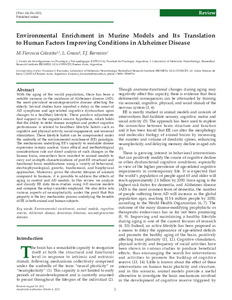Por favor, use este identificador para citar o enlazar este ítem:
https://repositorio.uca.edu.ar/handle/123456789/16478| Campo DC | Valor | Lengua/Idioma |
|---|---|---|
| dc.contributor.author | Colavitta, María Florencia | es |
| dc.contributor.author | Grasso, Lina | es |
| dc.contributor.author | Barrantes, Francisco José | es |
| dc.date.accessioned | 2023-06-06T14:24:38Z | - |
| dc.date.available | 2023-06-06T14:24:38Z | - |
| dc.date.issued | 2023 | - |
| dc.identifier.citation | Colavitta, M. F., Grasso, L., Barrantes, F. J. Environmental enrichment in murine models and its translation to human factors improving conditions in alzheimer disease [en línea]. The Journal of Prevention of Alzheimer's Disease. 2023, 10. doi: 10.14283/jpad.2023.5. Disponible en: https://repositorio.uca.edu.ar/handle/123456789/16478 | es |
| dc.identifier.issn | 2426-0266 (online) | - |
| dc.identifier.uri | https://repositorio.uca.edu.ar/handle/123456789/16478 | - |
| dc.description.abstract | Abstract: With the aging of the world population, there has been a notable increase in the incidence of Alzheimer disease (AD), the most prevalent neurodegenerative disease affecting the elderly. Several studies have reported a delay in the onset of AD symptoms and age-related cognitive dysfunction upon changes to a healthier lifestyle. These positive adjustments find support in the cognitive reserve hypothesis, which holds that the ability to defer disease inception and protect cognitive performance is related to healthier lifestyle habits such as cognitive and physical activity, social engagement, and sensorial stimulation. These lifestyle habits can be compounded under the umbrella of the environmental enrichment (EE) paradigm. The mechanisms underlying EE’s capacity to modulate disease expression remain unclear. Since ethical and methodological considerations rule out direct analysis of such changes in the human brain, researchers have resorted to animal models to carry out in-depth characterizations of post-EE structural and functional brain modifications using a variety of behavioral, electrophysiological, genetic, biochemical, and biophysical approaches. Moreover, given the shorter lifespan of animals compared to humans, it is possible to address the effects of aging in control and AD models. In this review we analyze and classify EE data from studies using AD murine models and compare the setup variables employed. We also delve into various aspects of neuroplasticity, under the posit that this property is the key mechanistic process underlying the benefits of EE in both animal and human subjects. | es |
| dc.format | application/pdf | es |
| dc.language.iso | eng | es |
| dc.publisher | Springer | es |
| dc.rights | Acceso restringido | * |
| dc.rights.uri | http://creativecommons.org/licenses/by-nc-sa/4.0/ | * |
| dc.source | The Journal of Prevention of Alzheimer's Disease. 2023, 10 | es |
| dc.subject | ENFERMEDAD DE ALZHEIMER | es |
| dc.subject | ENFERMEDADES NEURODEGENERATIVAS | es |
| dc.subject | CONDUCTA | es |
| dc.subject | DISFUNCION COGNITIVA | es |
| dc.subject | HABITOS SALUDABLES | es |
| dc.subject | NEUROPLASTICIDAD | es |
| dc.title | Environmental enrichment in murine models and its translation to human factors improving conditions in alzheimer disease | es |
| dc.type | Artículo | es |
| dc.identifier.doi | 10.14283/jpad.2023.5 | - |
| dc.identifier.pmid | 36946456 | - |
| uca.disciplina | MEDICINA | es |
| uca.issnrd | 0 | es |
| uca.affiliation | Fil: Colavitta, María Florencia. Pontificia Universidad Católica Argentina. Facultad de Psicología y Psicopedagogía. Centro de Investigaciones en Psicología y Psicopedagogía; Argentina | es |
| uca.affiliation | Fil: Colavitta, María Florencia. Pontificia Universidad Católica Argentina. Facultad de Ciencias Médicas. Instituto de Investigaciones Biomédicas. Laboratorio de Neurobiología Molecular; Argentina | es |
| uca.affiliation | Fil: Colavitta, María Florencia. Consejo Nacional de Investigaciones Científicas y Técnicas; Argentina | es |
| uca.affiliation | Fil: Grasso, Lina. Pontificia Universidad Católica Argentina. Facultad de Psicología y Psicopedagogía. Centro de Investigaciones en Psicología y Psicopedagogía; Argentina | es |
| uca.affiliation | Fil: Barrantes, Francisco José. Pontificia Universidad Católica Argentina. Facultad de Ciencias Médicas. Instituto de Investigaciones Biomédicas. Laboratorio de Neurobiología Molecular; Argentina | es |
| uca.affiliation | Fil: Barrantes, Francisco José. Consejo Nacional de Investigaciones Científicas y Técnicas; Argentina | es |
| uca.version | publishedVersion | es |
| item.fulltext | With Fulltext | - |
| item.languageiso639-1 | en | - |
| item.grantfulltext | reserved | - |
| crisitem.author.dept | Facultad de Psicología y Psicopedagogía | - |
| crisitem.author.dept | Centro de Investigaciones en Psicología y Psicopedagogía (CIPP) | - |
| crisitem.author.dept | Instituto de Investigaciones Biomédicas - BIOMED | - |
| crisitem.author.dept | Laboratorio de Neurobiología Molecular | - |
| crisitem.author.dept | Facultad de Ciencias Médicas | - |
| crisitem.author.orcid | 0000-0002-8079-372X | - |
| crisitem.author.orcid | 0000-0002-4745-681X | - |
| crisitem.author.parentorg | Pontificia Universidad Católica Argentina | - |
| crisitem.author.parentorg | Facultad de Psicología y Psicopedagogía | - |
| crisitem.author.parentorg | Facultad de Ciencias Médicas | - |
| crisitem.author.parentorg | Instituto de Investigaciones Biomédicas - BIOMED | - |
| crisitem.author.parentorg | Pontificia Universidad Católica Argentina | - |
| Aparece en las colecciones: | Artículos | |
Ficheros en este ítem:
| Fichero | Descripción | Tamaño | Formato | Login |
|---|---|---|---|---|
| environmental-enrichment-murine.pdf | 522,14 kB | Adobe PDF |  SOLICITAR ACCESO |
Visualizaciones de página(s)
58
comprobado en 27-abr-2024
Descarga(s)
35
comprobado en 27-abr-2024
Google ScholarTM
Ver en Google Scholar
Altmetric
Altmetric
Este ítem está sujeto a una Licencia Creative Commons

